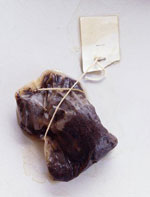
Global filter paper shortage to hit Sri Lankan tea “I don’t think this year we will be able to export as much tea bags as we did last year,” said Hakeem Akbarally from Akbar Brothers, one of the largest tea bag exporters in the country. “We can expect a drop in export volumes of tea bags this year, compared to last year and lower earnings from tea bags,” said Malik Fernando from the MJF Group. The reason, is a shortage of filter paper used to make tea bags. “There is a global shortage of tea bag paper and there is no substitute for this type of paper,” said Mr Akbarally. “There is about a 30% reduction in the production of filter paper, globally. The impact has not been felt by the local tea industry yet, but it will be felt within the next 6 months or so,” says Mr Fernando. Exporters estimate that Sri Lanka needs about 2,600 metric tonnes of filter paper per year to meet demand for tea bags. However, the supply is seen as unpredictable, making it difficult also to predict impacts on the Sri Lankan tea export industry. “Prices for filter paper have already increased. There is uncertainty. Suppliers are not telling what the real situation is,” said Mufaddal Jafferjee from Jafferjee Brothers. Prices have increased from around US$ 6.00 per kg of filter paper last year, to around US$ 7.75 per kg by now and some suppliers of filter paper are said to be unwilling even to quote prices. The Sri Lanka Tea Board (SLTB), when contacted, said that it had not been informed of a shortage of tea bag paper but agreed with exporters that the situation would impact tea exports. “No one has informed us about a shortage of tea bags or tea bag making paper. But most likely this would affect tea export incomes,” said SLTB Director General H.D. Hemaratna. Unless compensated by price and volume increases of bulk tea, the drop in tea bag incomes could reduce overall tea export earnings for the year. “Export of tea in tea bag form, is still very small, less than 10% of total exports. But although a small quantity, it is a high value export. A kilo of tea bags, on average, sells at around double the price of a kilo of bulk tea,” said Mr Hemaratna. In the first quarter of this year Sri Lanka exported 73.2 million kgs of tea. Out of this, only 4.6 million kgs were exported in value added tea bag form. However, on average tea bags sell at around US $ 5.00 - US$ 6.00 per kg, compared to around US$ 3.00 per kg of bulk tea. The global supply of filter paper is controlled by about three large companies, the biggest being the American company Glatfelter. The reduced supply of filter paper is attributed to the lower production of a natural raw material called ‘abaca’ used to manufacture filter paper. Abaca, commonly known as Manila hemp, is derived from the abaca plant, indigenous to the Philippines. The Philippines is the largest supplier of abaca to the world but is seeing a drop in production due to adverse weather conditions. Despite the supply reduction of abaca, the global demand for filter paper has increased. “Some countries that are not even tea producers, are importing bulk tea and packaging it for value addition. This creates a new demand. Filter paper is also used for other applications as well. So again there is a demand increase,” said Mr Hemaratna. The demand-supply shortfall is expected to push up prices of filter paper further, eating into tea bag profit margins, as the year progresses. |
|
||||||
|
||||||
| || Front
Page | News
| Editorial
| Columns
| Sports
| Plus
| Financial
Times | International
| Mirror
| TV
Times | Funday Times || |
| |
Reproduction of articles permitted when used without any alterations to contents and a link to the source page.
|
© Copyright
2008 | Wijeya
Newspapers Ltd.Colombo. Sri Lanka. All Rights Reserved. |
 A global shortage of filter paper, used in tea bags, is expected to hit Sri Lanka’s tea export earnings this year.
Sri Lanka’s tea sector has been encouraged to export tea in tea bags, to add value and increase incomes from tea. This strategy is also expected to help bypass price competition in global markets and compensate for the increasing costs of production in the country. However, this year, despite record production of tea, exporters are expecting reduced outputs and incomes from tea bags.
A global shortage of filter paper, used in tea bags, is expected to hit Sri Lanka’s tea export earnings this year.
Sri Lanka’s tea sector has been encouraged to export tea in tea bags, to add value and increase incomes from tea. This strategy is also expected to help bypass price competition in global markets and compensate for the increasing costs of production in the country. However, this year, despite record production of tea, exporters are expecting reduced outputs and incomes from tea bags.